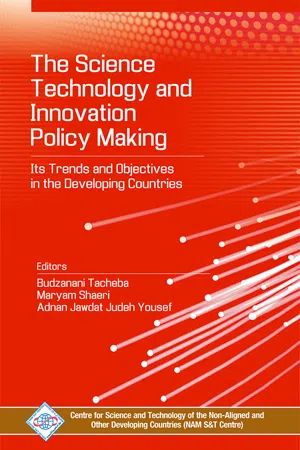
Science, Technology and Innovation Policy Making: Its Trends and Objectives in the Developing Countries
Tacheba, Budzanani
- English
- PDF
- Disponible sur iOS et Android
Science, Technology and Innovation Policy Making: Its Trends and Objectives in the Developing Countries
Tacheba, Budzanani
À propos de ce livre
Science, Technology and Innovation (STI) policy at the national level is expected to be commensurate with the challenges of the globalising society, it is observed that the STI potential of the developing countries often remains unexplored or underutilized due to lack of appropriate framework of formulation of the STI policy as well as inadequacies in its implementation mechanisms. While formulating, the national policy should take into account the availability of natural resources and human resource within the country; a planned long term forecast of the growth of various factors to achieve progressive economic prosperity till the planned period and beyond; projected import and export of raw materials; import of technology with its adaption to meet the local requirements; etc. Keeping the above in view, the Centre for Science & Technology of the Non-Aligned and Other Developing Countries (NAM S&T Centre) and the Technology Studies Institute (TSI) of the Presidency of the Islamic Republic of Iran organised an international workshop on 'Science, Technology and Innovation (STI) Policy Making for Developing Countries' during 28th November – 1st December 2014 at Kish Island, Iran. The above scientific event, which was attended by 26 experts, professionals, researchers and administrators from 13 countries, including Botswana, India, Indonesia, Iraq, Mauritius, Myanmar, Palestine, South Africa, Sri Lanka, Tanzania, Zambia, Zimbabwe and the host country Iran, facilitated the capacity building and exchange of information and expertise. The present book edited by Dr. Adnan Jawdat Judeh Yousef of Palestine, Dr. Budzanani Tacheba of Botswana and Ms. Maryam Shaeri of Iran is a follow up of the STI Policy Making workshop and comprises 22 scientific and technical papers contributed by eminent experts from 15 countries. The book has four sections, namely, STI Policy Developments; Institutional Setting and Processes; STI and Competitiveness; and Capacitating STI. The book is expected to be of great value for the researchers, professionals, experts, non-governmental and governmental organisations who are working on various facets of STI Policy formulation and implementation in the developing countries.The Centre for Science and Technology of the Non-Aligned and Other Developing Countries (NAM S&T Centre) is an inter-governmental organisation with a membership of 48 countries spread over Asia, Africa, Middle East and Latin America. Besides this, 12 S&T agencies and academic/research institutions of Bolivia, Botswana, Brazil, India, Nigeria and Turkey are the members of the S&T-Industry Network of the Centre. The Centre was set up in 1989 to promote South-South cooperation through mutually beneficial partnerships among scientists and technologists and scientific organisations in developing countries. It implements a variety of programmes including international workshops, meetings, roundtables, training courses and collaborative projects and brings out scientific publications, including a quarterly Newsletter. It is also implementing 7 Fellowship schemes, namely, NAM S&T Centre Research Fellowship, Joint NAM S&T Centre – ICCBS Karachi Fellowship, Joint CSIR/CFTRI (Diamond Jubilee) - NAM S&T Centre Fellowship, Joint NAM S&T Centre – ZMT Bremen Fellowship, Research Training Fellowship for Developing Country Scientists (RTF-DCS), NAM S&T Centre – U2ACN2 Research Associateship in Nanosciences and Nanotechnology and Joint NAM S&T Centre – DST (South Africa) Training Fellowship on Minerals Processing and Beneficiation in Indian institutions. These activities provide, among others, the opportunity for scientist-to-scientist contact and interaction, training and expert assistance, familiarising the scientific community on the latest developments and techniques in the subject areas, and identification of technologies for transfer between member countries. The Centre has so far brought out 68 publications and has organised 97 international workshops and training programmes.